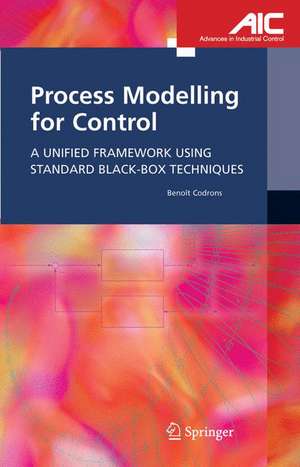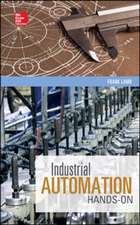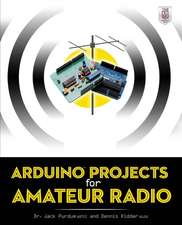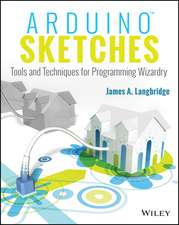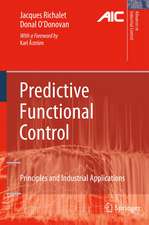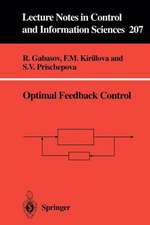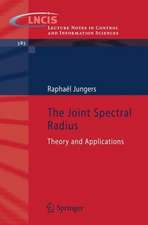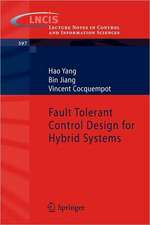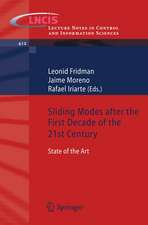Process Modelling for Control: A Unified Framework Using Standard Black-box Techniques: Advances in Industrial Control
Autor Benoît Codronsen Limba Engleză Hardback – 28 sep 2005
How should I carry out the identification of my process to obtain a good model?
How can I assess the quality of a model before to using it in control design?
How can I ensure that a controller will stabilise a real process well enough before implementation?
What is the most efficient method of order reduction to simplify the implementation of high-order controllers?
System identification, model/controller validation and order reduction are studied in a common framework. Detailed worked examples, representative of various industrial applications, are given.
This monograph uses mathematics convenient to researchers interested in real applications and to practising engineers interested in control theory. It enables control engineers to improve their methods and provides academics and graduate students with an all-round view of recent results in modelling for control.
| Toate formatele și edițiile | Preț | Express |
|---|---|---|
| Paperback (1) | 942.94 lei 43-57 zile | |
| SPRINGER LONDON – 21 oct 2010 | 942.94 lei 43-57 zile | |
| Hardback (1) | 948.92 lei 43-57 zile | |
| SPRINGER LONDON – 28 sep 2005 | 948.92 lei 43-57 zile |
Din seria Advances in Industrial Control
- 15%
 Preț: 643.34 lei
Preț: 643.34 lei - 23%
 Preț: 582.63 lei
Preț: 582.63 lei - 18%
 Preț: 783.98 lei
Preț: 783.98 lei - 18%
 Preț: 947.35 lei
Preț: 947.35 lei - 20%
 Preț: 568.24 lei
Preț: 568.24 lei - 15%
 Preț: 643.16 lei
Preț: 643.16 lei - 18%
 Preț: 899.21 lei
Preț: 899.21 lei - 18%
 Preț: 891.33 lei
Preț: 891.33 lei - 18%
 Preț: 740.57 lei
Preț: 740.57 lei - 18%
 Preț: 961.23 lei
Preț: 961.23 lei - 18%
 Preț: 955.08 lei
Preț: 955.08 lei - 15%
 Preț: 645.28 lei
Preț: 645.28 lei - 15%
 Preț: 638.43 lei
Preț: 638.43 lei - 18%
 Preț: 901.11 lei
Preț: 901.11 lei - 18%
 Preț: 1410.94 lei
Preț: 1410.94 lei - 18%
 Preț: 728.91 lei
Preț: 728.91 lei - 20%
 Preț: 1003.78 lei
Preț: 1003.78 lei - 18%
 Preț: 947.35 lei
Preț: 947.35 lei - 15%
 Preț: 643.34 lei
Preț: 643.34 lei - 15%
 Preț: 654.30 lei
Preț: 654.30 lei - 18%
 Preț: 950.52 lei
Preț: 950.52 lei - 15%
 Preț: 644.30 lei
Preț: 644.30 lei - 18%
 Preț: 1393.09 lei
Preț: 1393.09 lei - 18%
 Preț: 950.21 lei
Preț: 950.21 lei - 18%
 Preț: 949.90 lei
Preț: 949.90 lei - 18%
 Preț: 949.42 lei
Preț: 949.42 lei - 18%
 Preț: 950.52 lei
Preț: 950.52 lei - 18%
 Preț: 1113.71 lei
Preț: 1113.71 lei - 15%
 Preț: 650.04 lei
Preț: 650.04 lei - 15%
 Preț: 644.95 lei
Preț: 644.95 lei - 18%
 Preț: 950.33 lei
Preț: 950.33 lei - 18%
 Preț: 948.61 lei
Preț: 948.61 lei - 18%
 Preț: 1112.60 lei
Preț: 1112.60 lei - 15%
 Preț: 644.63 lei
Preț: 644.63 lei - 18%
 Preț: 953.20 lei
Preț: 953.20 lei - 18%
 Preț: 945.62 lei
Preț: 945.62 lei - 15%
 Preț: 640.88 lei
Preț: 640.88 lei - 15%
 Preț: 640.88 lei
Preț: 640.88 lei - 20%
 Preț: 650.92 lei
Preț: 650.92 lei - 18%
 Preț: 1112.60 lei
Preț: 1112.60 lei - 20%
 Preț: 998.36 lei
Preț: 998.36 lei - 15%
 Preț: 643.34 lei
Preț: 643.34 lei - 18%
 Preț: 1381.43 lei
Preț: 1381.43 lei - 15%
 Preț: 651.51 lei
Preț: 651.51 lei - 15%
 Preț: 647.08 lei
Preț: 647.08 lei - 20%
 Preț: 563.66 lei
Preț: 563.66 lei - 18%
 Preț: 992.64 lei
Preț: 992.64 lei - 18%
 Preț: 1225.79 lei
Preț: 1225.79 lei
Preț: 948.92 lei
Preț vechi: 1157.22 lei
-18% Nou
Puncte Express: 1423
Preț estimativ în valută:
181.63€ • 197.36$ • 152.67£
181.63€ • 197.36$ • 152.67£
Carte tipărită la comandă
Livrare economică 21 aprilie-05 mai
Preluare comenzi: 021 569.72.76
Specificații
ISBN-13: 9781852339180
ISBN-10: 1852339187
Pagini: 264
Ilustrații: XXXIII, 229 p.
Dimensiuni: 155 x 235 x 20 mm
Greutate: 0.54 kg
Ediția:2005
Editura: SPRINGER LONDON
Colecția Springer
Seria Advances in Industrial Control
Locul publicării:London, United Kingdom
ISBN-10: 1852339187
Pagini: 264
Ilustrații: XXXIII, 229 p.
Dimensiuni: 155 x 235 x 20 mm
Greutate: 0.54 kg
Ediția:2005
Editura: SPRINGER LONDON
Colecția Springer
Seria Advances in Industrial Control
Locul publicării:London, United Kingdom
Public țintă
ResearchCuprins
Preliminary Material.- Identification in Closed Loop for Better Control Design.- Dealing with Controller Singularities in Closed-loop Identification.- Model and Controller Validation for Robust Control in a Prediction-error Framework.- Control-oriented Model Reduction and Controller Reduction.- Some Final Words.
Recenzii
From the reviews:
“This book is unique in that it presents the first comprehensive study on identification of models for robust control design and validation. … Thus, the target audience for this book is mostly academics in the control field. … The book presents several numerical examples to illustrate the topics discussed and to confirm expected results. In general, I found the examples to be excellent in referring to practical situations that illustrate the theoretical arguments presented in the book.” (Hector M. Budman, IEEE Control Systems Magazine, Vol. 27, June, 2007)
“This book is unique in that it presents the first comprehensive study on identification of models for robust control design and validation. … Thus, the target audience for this book is mostly academics in the control field. … The book presents several numerical examples to illustrate the topics discussed and to confirm expected results. In general, I found the examples to be excellent in referring to practical situations that illustrate the theoretical arguments presented in the book.” (Hector M. Budman, IEEE Control Systems Magazine, Vol. 27, June, 2007)
Notă biografică
Doctor Codrons is ideally suited to authorship in the Advances in Industrial Control Series having both academic and industrial experience. He has worked for the large French electricity supply company Électricité de France and then a four-and-a-half-year academic appointment at the Université Catholique de Louvain studying control-oriented system modelling techniques. He now works for the research arm of the Belgian national supplier as a project leader in process control.
Textul de pe ultima copertă
Many process control books focus on control design techniques, taking the construction of a process model for granted. Process Modelling for Control concentrates on the modelling steps underlying a successful design, answering questions like:
How should I carry out the identification of my process in order to obtain a good model?
How can I assess the quality of a model with a view to using it in control design?
How can I ensure that a controller will stabilise a real process and achieve a pre-specified level of performance before implementation?
What is the most efficient method of order reduction to facilitate the implementation of high-order controllers?
Different tools, namely system identification, model/controller validation and order reduction are studied in a framework with a common basis: closed-loop identification with a controller that is close to optimal will deliver models with bias and variance errors ideally tuned for control design. As a result, rules are derived, applying to all the methods, that provide the practitioner with a clear way forward despite the apparently unconnected nature of the modelling tools. Detailed worked examples, representative of various industrial applications, are given: control of a mechanically flexible structure; a chemical process; and a nuclear power plant.
Process Modelling for Control uses mathematics of an intermediate level convenient to researchers with an interest in real applications and to practising control engineers interested in control theory. It will enable working control engineers to improve their methods and will provide academics and graduate students with an all-round view of recent results in modelling for control.
Advances in Industrial Control aims to report and encourage the transfer of technology in control engineering. The rapid development of control technology has an impact on all areas of the control discipline. The series offers an opportunity for researchers to present an extended exposition of new work in all aspects of industrial control.
How should I carry out the identification of my process in order to obtain a good model?
How can I assess the quality of a model with a view to using it in control design?
How can I ensure that a controller will stabilise a real process and achieve a pre-specified level of performance before implementation?
What is the most efficient method of order reduction to facilitate the implementation of high-order controllers?
Different tools, namely system identification, model/controller validation and order reduction are studied in a framework with a common basis: closed-loop identification with a controller that is close to optimal will deliver models with bias and variance errors ideally tuned for control design. As a result, rules are derived, applying to all the methods, that provide the practitioner with a clear way forward despite the apparently unconnected nature of the modelling tools. Detailed worked examples, representative of various industrial applications, are given: control of a mechanically flexible structure; a chemical process; and a nuclear power plant.
Process Modelling for Control uses mathematics of an intermediate level convenient to researchers with an interest in real applications and to practising control engineers interested in control theory. It will enable working control engineers to improve their methods and will provide academics and graduate students with an all-round view of recent results in modelling for control.
Advances in Industrial Control aims to report and encourage the transfer of technology in control engineering. The rapid development of control technology has an impact on all areas of the control discipline. The series offers an opportunity for researchers to present an extended exposition of new work in all aspects of industrial control.
Caracteristici
Will show the reader how to identify and evaluate useful models that can subsequently be used as a basis for control design Gives the reader an all-round view of recent results in modelling for control from both academic and industrial perspectives Includes supplementary material: sn.pub/extras
